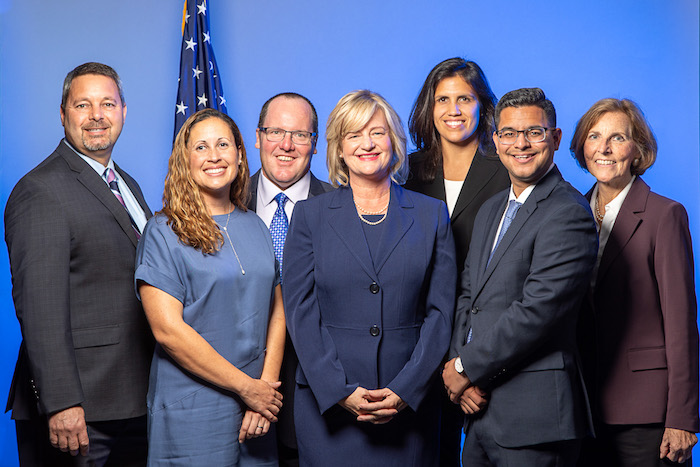The Costa Mesa City Council on Tuesday Jan. 15 is poised to take a historic step forward by both providing shelter beds for individuals experiencing homelessness and restoring the safety and well-being of communities and residents.
Homelessness has been one of the most pressing issues in Costa Mesa, and by establishing the next phase of a comprehensive Westside Restoration Plan, the City Council can embrace both short-term and long-term solutions to providing unsheltered individuals a place to live while developing plans for permanent housing.
“The fact is that our first responders are spending more and more time grappling with the issue of homelessness, which as a result, is putting the rest of our community’s public safety at greater risk,” Mayor Katrina Foley said. “Additionally, homelessness costs our county’s hospitals $77 million annually, making health care more expensive for all of us. We must resolve homelessness – not only because it is so costly to taxpayers and erodes our local quality of life – but also because it leads to profound human suffering in our community. Solving this challenge is the humane and right thing to do.”
Up for approval Tuesday will be a plan for the city to engage in a partnership with the Lighthouse Church of the Nazarene to make improvements and expand what is an already existing inclement weather shelter and homeless check-in center as well as to purchase a 12,000-square-foot office building at 1040 W. 17th Street that will be redeveloped into a permanent solution to offer shelter beds to those in need. Property improvements would include exterior fencing, lighting and landscaping.
Click here to read the staff report.
“Finding permanent solutions to homelessness, improving public safety, and re-investing in our Westside neighborhoods were key priorities in the recent election,” Council Member Arlis Reynolds said. “Staff’s proposal is designed to address all of these issues while meeting our city’s legal obligations. It is very important to hear from our residents and businesses, and I encourage the public to read the staff report and share their input with council members ahead of our Tuesday meeting.”
Through this temporary shelter arrangement with the Lighthouse Church, the city would invest in the property in order to provide the 50 shelter beds that it is expected to create based on a proposed settlement agreement in the OC Catholic Worker lawsuit that in turn would restore the city’s powers to enforce trespassing and anti-encampment ordinances.
Additionally, the purchase of this $4 million facility would allow the council to create a bridge shelter, where unsheltered individuals could also receive job training and placement, mental health assessment, health and dental care, substance abuse treatment and connections to permanent housing.
Both of these facilities would be run by a combination of city outreach staff and an experienced well-respected operator who will ensure the facility is a reservation-based model along with 24-hour security and management covering a half-mile radius.
This proposal is part of a broader Westside Restoration Plan, a commitment by the council to restore public safety and the character of Westside neighborhoods. Recent enhancements to the Westside include the Lions Park Project, Lions Park Playground Improvements, Street Rehabilitation Projects, the Harbor Median Improvement Project, the West 19th Street Bicycle Facility Improvements, Anaheim Avenue and West 18th Street Parkway Improvements, the Senior Center Fence Project and Shalimar Park Improvements.
By embarking on this solution to homelessness, Costa Mesa joins the broader efforts of the cities of Anaheim, Santa Ana, Orange, Tustin, Fullerton and Buena Park and the county of Orange in taking an active solution to combatting the crisis of homelessness throughout the county and beyond.
A 2017 study conducted by the University of California Irvine, United Way and Jamboree Housing estimated the annual cost of homelessness in Orange County to be $299 million, $120 million of which is shouldered by cities.
Costa Mesa has been a leader on this issue. Since 2013, the Network for Homeless Solutions – which includes City staff and representatives of faith-based organizations and local non-profits – meets weekly to discuss specific cases and developments in our efforts to reduce homelessness in Costa Mesa.
Costa Mesa outreach workers make contact daily with individuals experiencing homelessness and the city spends approximately $1 million each year on this effort. Funds are expended on outreach workers as well as police officers assigned to our Community Policing Unit.
In addition, Mayor Pro-Tem John Stephens is currently the Chairman of the ACC-OC Homelessness Task Force, an advocacy group for Orange County cities.
“It is my goal to substantially reduce homelessness in Costa Mesa,” said Council Member Stephens. “I am proud that we as a city are pursuing the creation of this Bridge Shelter and I hope this will be a first step in providing permanent supportive housing to those in need.”
The timing is right for these efforts. Last February, with Stephens at the helm of the Homelessness Task Force, ACC-OC rolled out a plan to develop 2,700 permanent supportive housing units throughout Orange County over the next seven years.
Both private and public funding would be used to achieve this goal, and existing legislation has established the Orange County Housing Trust, which may be used to pool public (i.e., state grants) and private funds to provide financing for the permanent supportive housing projects.
Other cities are also making great strides in this area. The Orchard, developed by Community Development Partners and operated by Mercy House, is a successful example of a permanent supportive housing project in Santa Ana. Formerly a dilapidated, abandoned motel, most of the residents of the 71-unit project were relocated from the Civic Center encampment.
These individuals are now permanently off the streets. Another noteworthy example is the Cove in Newport Beach, recently launched by Community Development Partners and Mercy House. The Cove is a permanent supportive apartment complex serving formerly homeless veterans and seniors.
To reach the City Council please click here to access each individual council member’s page or email the entire council at citycouncil@costamesaca.gov.




